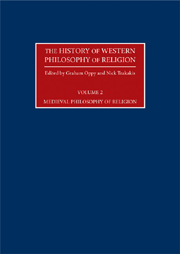Book contents
- Frontmatter
- Contents
- Editorial Introduction
- Contributors
- 1 Medieval Philosophy of Religion: An Introduction
- 2 Boethius
- 3 Johannes Scottus Eriugena
- 4 Al-Farabi
- 5 Avicenna (Ibn Sina)
- 6 Anselm of Canterbury
- 7 Al-Ghazali
- 8 Peter Abelard
- 9 Bernard of Clairvaux
- 10 Averroes (Ibn Rushd)
- 11 Moses Maimonides
- 12 Roger Bacon
- 13 Thomas Aquinas
- 14 John Duns Scotus
- 15 William Ockham
- 16 Gersonides
- 17 John Wyclif
- 18 Nicholas of Cusa
- 19 Erasmus of Rotterdam
- Chronology
- Bibliography
- Index
5 - Avicenna (Ibn Sina)
- Frontmatter
- Contents
- Editorial Introduction
- Contributors
- 1 Medieval Philosophy of Religion: An Introduction
- 2 Boethius
- 3 Johannes Scottus Eriugena
- 4 Al-Farabi
- 5 Avicenna (Ibn Sina)
- 6 Anselm of Canterbury
- 7 Al-Ghazali
- 8 Peter Abelard
- 9 Bernard of Clairvaux
- 10 Averroes (Ibn Rushd)
- 11 Moses Maimonides
- 12 Roger Bacon
- 13 Thomas Aquinas
- 14 John Duns Scotus
- 15 William Ockham
- 16 Gersonides
- 17 John Wyclif
- 18 Nicholas of Cusa
- 19 Erasmus of Rotterdam
- Chronology
- Bibliography
- Index
Summary
Ibn Sina, the ‘Avicenna’ of the Latin West, is arguably one of the most significant thinkers and original system-builders in the history of western philosophy. Indeed, his renown in the Islamic world has brought him the title al-Shaykh al-Raʾīs (‘the leading eminent scholar’). We are fortunate that Avicenna, in an uncustomary fashion, wrote an autobiography detailing his early education. Additionally, one of his students, al-Juzjani, chronicled the later part of Avicenna's life. Thus we are on fairly sure ground concerning the details of much of his personal life.
Abu ʿAli al-Husayn ibn ʿAbdallah ibn Sina was born in 980 in the small village of Afshana in what is now part of Uzbekistan and was then part of the Samanid dynasty. His father was the governor of Kharmaythan, an important village in northern Persia outside of Buhkara, the seat of Samanid rule. Avicenna by all accounts was a prodigy; he claimed that by the age of ten he had completed the study of the Qu'ran and a major part of his belles lettres and already had surpassed his teacher of logic, Abu ʿAbdallah al-Natiliʾ. He continued his own education thereafter, and claimed that by eighteen he had taught himself, and in fact mastered, all the sciences, including Islamic law, astronomy, medicine and, of course, philosophy. It was his knowledge of medicine that provided him an introduction to the Samanid Sultan, Nuh ibn Mansur, who was suffering from an ailment that baffled the court physicians.
- Type
- Chapter
- Information
- The History of Western Philosophy of Religion , pp. 61 - 72Publisher: Acumen PublishingPrint publication year: 2009

